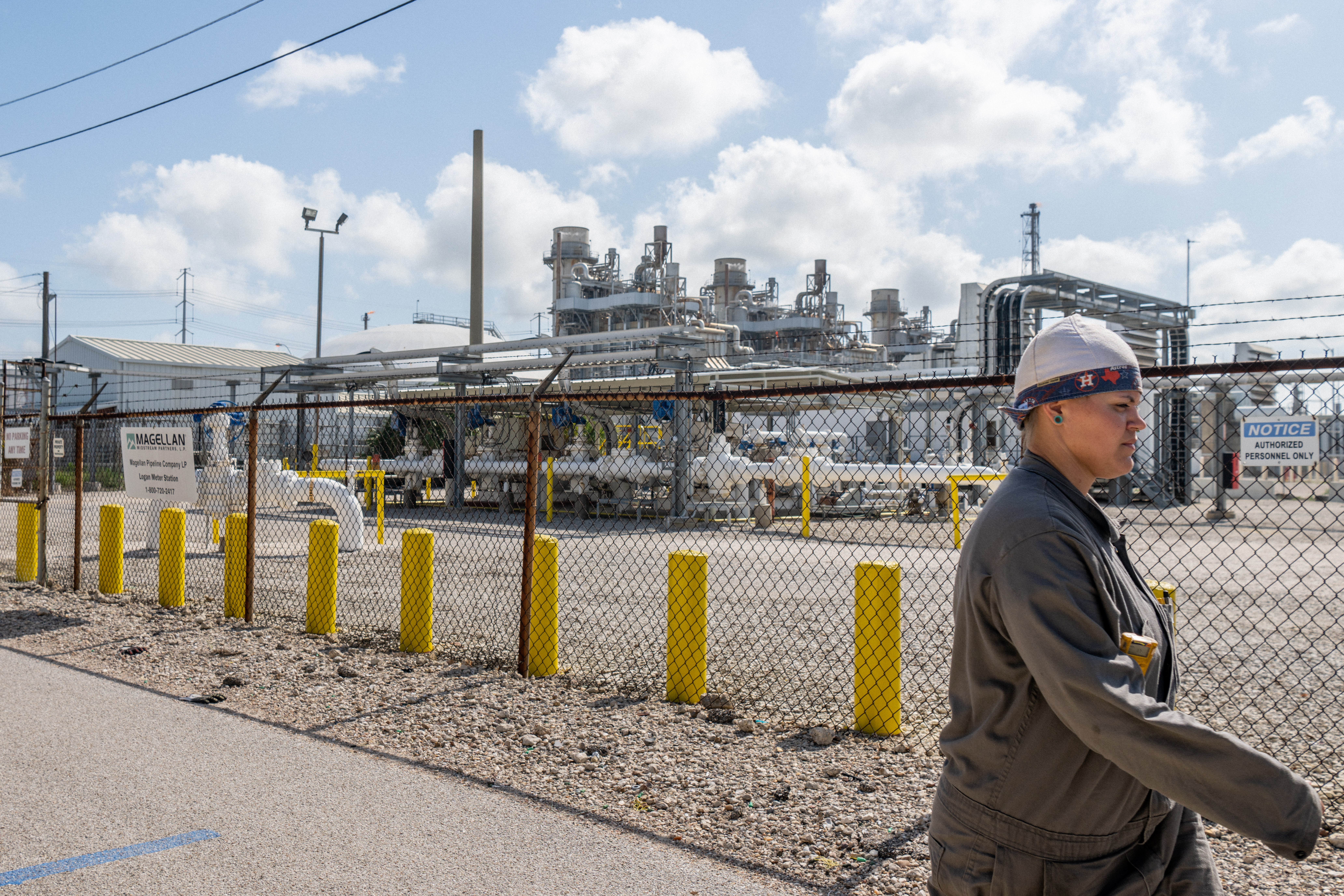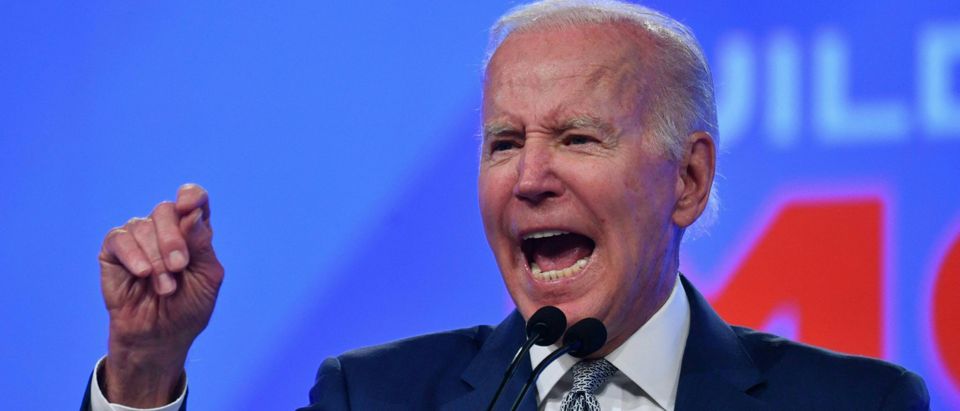UPDATE: This article has been updated to include comments from ExxonMobil, Chevron, Shell, Phillips 66, Marathon and the American Fuel & Petrochemical Manufacturers.
- President Joe Biden sent letters to seven major oil companies Wednesday, saying he would take action if they didn’t boost fuel output from their domestic refineries.
- “I understand that many factors contributed to the business decisions to reduce refinery capacity, which occurred before I took office,” Biden wrote in the letters. “But at a time of war, refinery profit margins well above normal being passed directly onto American families are not acceptable.”
- “We are surprised and disappointed by the President’s letter,” American Fuel & Petrochemical Manufacturers (AFPM) President and CEO Chet Thompson said in a statement to The Daily Caller News Foundation. “Any suggestion that U.S. refiners are not doing our part to bring stability to the market is false.”
President Joe Biden wrote a letter Wednesday to oil industry executives, warning them he would take action if they don’t boost refining output, Axios reported.
Biden warned the leaders of seven major U.S. oil producers and refiners — ExxonMobil, Chevron, BP America, Shell USA, Phillips 66, Marathon and Valero — that he was “prepared to use all reasonable and appropriate Federal Government tools and emergency authorities” to increase petroleum refinery capacity and output, according to the letter obtained by Axios. The average price of gasoline nationwide hit a record $5.02 per gallon Tuesday while the average price of diesel fuel hit an all-time high of $5.78 a gallon Wednesday, according to AAA data.
“I understand that many factors contributed to the business decisions to reduce refinery capacity, which occurred before I took office,” Biden wrote in the letters. “But at a time of war, refinery profit margins well above normal being passed directly onto American families are not acceptable.”
“With prices for your product where they are today, you have ample market incentive to take these actions, and I recognize that some of you have already begun to do so,” he continued. (RELATED: RUNNING ON EMPTY: America’s Diesel Stockpiles Are Rapidly Dwindling, Fuel Rationing On The Horizon)
However, U.S. refining capacity utilization surged to 94.2% earlier this month, its highest rate since late 2019, and is expected to average 94% between July-September, according to a June 7 report from the Energy Information Administration (EIA). Refining utilization measures how much fuel refiners produce from crude oil inputs relative to their total production capacity.
The EIA noted that, while refinery utilization will continue to increase over the upcoming months, total output will remain relatively low since total domestic capacity has dropped by 900,000 barrels per day since 2019. Total U.S. operable refinery capacity peaked at nearly 19 million barrels per day in early 2020, but has since fallen to about 17.9 million barrels per day, the latest federal data showed.
“Though our refinery footprint in the U.S. is relatively small today, we are producing at capacity and continue to explore options that would have the result of delivering additional energy products to customers in the U.S. and abroad,” Shell spokesperson Curtis Smith told The Daily Caller News Foundation in an email. “Those efforts include accelerating new and existing production of crude oil in the Gulf of Mexico and repurposing an idled refinery in Louisiana (Convent) that will produce lower-carbon fuels and products.”
ExxonMobil said it has been in regular contact with the White House to update it on its continued investments in domestic oil and gas supplies in a statement shared with TheDCNF. The Texas-based company added that the federal government should promote investment through “clear and consistent policy” such as streamlining the regulatory approval process for fossil fuel infrastructure and holding regular oil and gas lease sales.
“We’ve been investing through the downturn to increase refining capacity to process U.S. light crude by about 250,000 barrels per day – the equivalent of adding a new medium-sized refinery,” the statement continued. “We kept investing even during the pandemic, when we lost more than $20 billion and had to borrow more than $30 billion to maintain investment to increase capacity to be ready for post-pandemic demand.”

A worker exits the Marathon Galveston Bay Refinery on May 10 in Texas City, Texas. (Brandon Bell/Getty Images)
Phillips 66 spokesperson Bernardo Fallas confirmed the company had received Biden’s letter and wanted to “underscore that U.S. refineries are running at record-high utilization rates” and that expanding refinery capacity was a long-term proposition, not a short-term fix.
“Chevron is committed to the supply of affordable, reliable, ever-cleaner energy in the United States and across the globe,” Chevron spokesperson Bill Turenne told TheDCNF. “We understand the significant concerns around higher fuel prices currently faced by consumers around the country, and the world. We share these concerns, and expect the Administration’s approach to energy policy will start to better reflect the importance of addressing them.”
“Unfortunately, what we have seen since January 2021 are policies that send a message that the Administration aims to impose obstacles to our industry delivering energy resources the world needs,” he said.
The last major refinery to be constructed in the U.S. was the Marathon facility built in Louisiana in 1977. Industry groups and experts blamed the declining capacity and lack of new refineries on environmental regulation and projected fuel demand decline in the future as governments push green energy alternatives.
“We are surprised and disappointed by the President’s letter,” American Fuel & Petrochemical Manufacturers (AFPM) President and CEO Chet Thompson said in a statement to TheDCNF. “Our team at AFPM has been working closely with the Administration—as recently as this week—providing industry insights and policy recommendations to address the global energy challenge. Any suggestion that U.S. refiners are not doing our part to bring stability to the market is false.”
“We would encourage the Administration to look inward to better understand the role their policies and hostile rhetoric have played in the current environment,” he continued.
Mike Sommers, the CEO of the American Petroleum Institute, said that his group appreciated the opportunity for dialogue with the White House but that the “administration’s misguided policy agenda shifting away from domestic oil and natural gas has compounded inflationary pressures and added headwinds to companies’ daily efforts to meet growing energy” in a statement.
Biden added in his letters that Energy Secretary Jennifer Granholm will host an emergency meeting on domestic refining capacity.
Marathon spokesperson Jamal Kheiry said the company looked forward to speaking with the Biden administration in an email. BP America declined to comment.
The White House, Energy Department and Valero didn’t respond to requests for comment from TheDCNF.
All content created by the Daily Caller News Foundation, an independent and nonpartisan newswire service, is available without charge to any legitimate news publisher that can provide a large audience. All republished articles must include our logo, our reporter’s byline and their DCNF affiliation. For any questions about our guidelines or partnering with us, please contact licensing@dailycallernewsfoundation.org.


